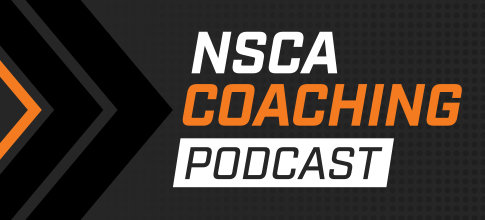NSCA’s Coaching Podcast, Episode 24: Brett Bartholomew
by Scott Caulfield and Brett Bartholomew
Coaching Podcast
February 2018
Brett Bartholomew, founder of the performance coaching and consulting company, The Bridge Human Performance, talks to the NSCA Head Strength and Conditioning Coach, Scott Caulfield, about learning what drives people, how to interact effectively with others, adapting to change, and the value in learning from other fields.
Brett Bartholomew, CSCS, RSCC, is a strength and conditioning coach, author, consultant, and Founder of the performance coaching and consulting company, The Bridge Human Performance®. His experience includes working with athletes both in the team environment and private sector along with members of the United States Special Forces and members of Fortune 500 companies.
Taken together, Brett has coached a diverse range of athletes from across 23 sports world-wide, at levels ranging from youth athletes to Olympians. He’s supported numerous Super Bowl and World Series Champions, along with several professional fighters in both professional boxing as well as the UFC.
Follow Brett on Instagram: @coach_brettb | Find Scott on Twitter: @scottcaulfield
Show Notes
“People think the private sector is more personal training; some people think team coaches get comfortable in their roles and it’s kind of glorified, and I think there’s a lot more commonalities between the two than most realize.” 1:17
“You see that a lot—people battling over who’s got the best training and who’s got the best this. I’m not trying to sit here… and say ‘My training is the best training.’” 5:21
“I think it comes down to three aspects: the physiological, the psychological, and the cultural element… you need to know what drives people… these guys don’t care about getting under 85% and what that does to the nervous system the same way that we do… you need to get them to adhere to it.” 6:25
Book: Conscious Coaching: The Art and Science of Building Buy-In 8:10
“People are the ultimate performance variable, and if you don’t know what makes them tick, you’re gonna be a pretty poor coach.” 9:58
“Somebody can be smart but not intelligent.” 11:16
“I think sometimes we push principles and practices too much and not enough of just the intangibles of coaching.” 13:45
“There’s this notion that unless you’ve coached ‘x’ amount of years, that you’re not skilled… you have to be able to find talent everywhere.” 14:09
“Do the simple things savagely well.” 16:27
“… Seek outside influences—if you’re only learning from strength and conditioning, you’re not broadening yourself to the best of your ability.” 17:21
“You’re constantly trying to cater to a demand while staying true to a craft.” 17:37
“We have to be the multidisciplinary learners we say that we are… learn from everybody. Don’t just learn from other strength coaches.” 18:24
“The number one thing I look for… you have to have some level of consciousness of what you’re looking for and how to talk to people.” 19:12
“I just look for the basics: do you have a good handshake, can you look me in the eye, can you send a thoughtful email?” 19:43
Book: Robert Sapolsky’s Behave: The Biology of Humans at Our Best and Worst 27:37
“People have agendas… you just gotta understand how to balance that.” 28:06
“Our job is very important, but we’re not heart surgeons.” 29:18
“You have to adapt yourself to the world or you can’t complain when the world happens to you.” 30:45
Reporting Errors: To report errors in a podcast episode requiring correction or clarification, email the editor at publications@nsca.com or write to NSCA, attn: Publications Dept., 1885 Bob Johnson Dr., Colorado Springs, CO 80906. Your letter should be clearly marked as a letter of complaint. Please (a) identify in writing the precise factual errors in the published podcast episode (every false, factual assertion allegedly contained therein), (b) explain with specificity what the true facts are, and (c) include your full name and contact information.
- Privacy Policy
- Your Privacy Choices
- Terms of Use
- Retraction and Correction Policy
- © 2026 National Strength and Conditioning Association
